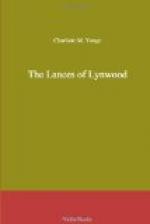As he hesitated to advance, the Prince, raising his eyes, encountered that earnest and sorrowful gaze, but only responding by a stern glance of displeasure. Eustace, however, stepped forward, and bending one knee, said, “My Lord, I come to report myself as returned to your service, and at the same time to crave for my nephew the protection you were graciously pleased to promise him.”
“It is well, Sir Eustace Lynwood,” said Edward, coldly, and with a movement of his head, as if to dismiss him from his presence; “and you, boy, come hither,” he added as Arthur, seeing his uncle rise and retreat a few steps, was following his example. “I loved your father well,” he said, laying his hand on the boy’s bright wavy hair, “and you shall find in me a steady friend as long as you prove yourself not unworthy of the name you bear.”
In spite of the awe with which Arthur felt his head pressed by that royal hand, in spite of his reverence for the hero and the Prince, he raised his eyes and looked upon the face of the Prince with an earnest, pleading, almost upbraiding gaze, as if, child as he was, he deprecated the favour, which so evidently marked the slight shown to his uncle. But the Prince did not heed him, and rising from his chair, said, “Thine arm, Clarenham. Let us to the Princess, and present her new page. Follow me, boy.”
With a wistful look at his uncle, standing alone on the step of the dais, Arthur reluctantly followed the Prince as, leaning on Clarenham’s arm, he left the hall, and, crossing a gallery, entered a large apartment. At one end was a canopy embroidered with the arms and badges of the heir of England, and beneath it were two chairs of state, one of which was occupied by Joan Plantagenet, Princess of Wales, once the Fair Maid of Kent, and though now long past her youth, still showing traces of beauty befitting the lady for whom her royal cousin had displayed such love and constancy.
As her husband entered, she rose, and looking anxiously at him, while she came forward to meet him, inquired whether he felt fatigued. “No, my fair dame,” replied the Prince, “I came but to present you your new page; the young cousin, respecting whose safety my Lord de Clarenham hath been so much in anxiety.”
“Then it is his uncle who hath brought him?” asked Joan.
“Yes,” replied Edward, “he himself brought him to the hall, and even had the presumption to claim the protection for him that I pledged to his father, when I deemed far otherwise of this young Eustace.”
“What account does he give of the length of time that he has spent on the road?” asked the Princess.
“Ay, there is the strangest part of the tale,” said Fulk Clarenham, with a sneer, “since he left the poor simple men at Lynwood believing that he was coming at full speed to seek my Lord the Prince’s protection for the child, a convenient excuse for eluding the inquiries of justice into his brawls at the funeral, as well as for the rents which he carried off with him; but somewhat inconsistent when it is not for five months that he makes his appearance at Bordeaux, and then in the society of a band of routiers.”




